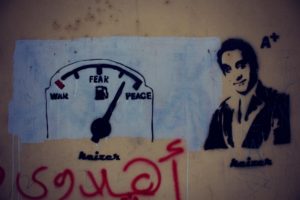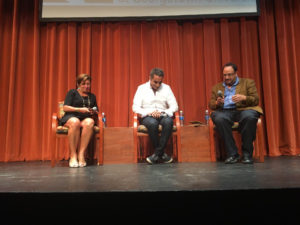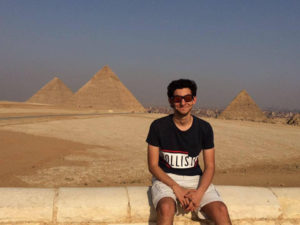Bassem Youssef's Political Satire Misleads Public
 Political satire has been present in the Arab world since the eighth and ninth centuries. In countries like Egypt and Lebanon, numerous satirical TV shows and programs serve as a form of political protest. Satire in these countries can play a large role within politics that prompts prestigious universities in the United States, such as Georgetown and Harvard, to invite comedians to give lectures and hold discussions. The famous self-exiled Egyptian satirist Bassem Youssef came to Georgetown on September 21 for a discussion about satire and politics in both Egypt and the United States. Although many see Youssef as an icon for freedom of expression, critics believe that Youssef manipulates the global common misconception of satire in the Middle East for personal gain.
Political satire has been present in the Arab world since the eighth and ninth centuries. In countries like Egypt and Lebanon, numerous satirical TV shows and programs serve as a form of political protest. Satire in these countries can play a large role within politics that prompts prestigious universities in the United States, such as Georgetown and Harvard, to invite comedians to give lectures and hold discussions. The famous self-exiled Egyptian satirist Bassem Youssef came to Georgetown on September 21 for a discussion about satire and politics in both Egypt and the United States. Although many see Youssef as an icon for freedom of expression, critics believe that Youssef manipulates the global common misconception of satire in the Middle East for personal gain.
Youssef is a cardiac surgeon-turned-satirist who became famous during the Arab Spring for a political satire show that he broadcasted on YouTube. Afterwards, he moved to network television under his show, Al Bernameg, which heavily criticised former Egyptian President Morsi and the current president, El-Sisi. Under both regimes, Youssef claims to have received death threats and created an aura of concern in order to increase market value and to maintain the show’s popularity. In June 2014, Youssef abruptly ended his show with no clear justification. His show was not banned, so many are unsure why he ended it during El-Sisi’s regime. When asked about the circumstances surrounding his show’s end in the discussion hosted by Georgetown, Youssef declined to give any details.

Instead, Youssef personalized questions and spoke about his experiences with discrimination. He asked the audience members not to record the discussion, as he claimed that it would endanger his family back home. Despite Youssef’s existing reputation as a vocal El-Sisi opponent, however, his family has so far been untouched. In the discussion, Youssef insinuated that President El-Sisi was a bad and incompetent dictator. Furthermore, the satirist expressed concern over El-Sisi’s purchase of foreign products like Rafale fighter jets and energy turbines from countries like France and Germany in order to earn their silence over human rights violations. Such accusations fail to consider the situation in Egypt post-Arab Spring and Youssef’s lack of expertise in military affairs. The country endured two revolutions and three years of economic downfall, not to mention regional hostilities and the increasing presence of terrorist groups.
Youssef suggested that El-Sisi does not have sufficient popularity and that he rules through fear. However, according to a survey, 82 percent of Egyptians support El-Sisi as of August 2016. In addition, the survey indicates that the main sources of El-Sisi’s popularity included security and infrastructure improvements. It appears that Youssef fails to understand that, despite the drawbacks of El-Sisi’s presidency, Egyptians still support him because he provides security and stability that eludes many other countries in the Middle East.
Youssef has proven himself to be a misinformed individual who takes a position unpopular among Egyptians. He lives thousands of miles away in the U.S., making a living by insulting the Egyptian government and their supporters on university campuses and talk shows. He is neither a hero nor an inspiration for Egyptians. Georgetown and other universities should invite different viewpoints to offer students a more balanced political dialogue.
 Wasil is an Egyptian freshman in the School of Foreign Service studying International Politics. He has lived in 9 countries, speaks 5 languages and is the founder of a community service NGO called Clean & Green Egypt. In addition, Wasil writes for his own media outlet named Nile Scope.
Wasil is an Egyptian freshman in the School of Foreign Service studying International Politics. He has lived in 9 countries, speaks 5 languages and is the founder of a community service NGO called Clean & Green Egypt. In addition, Wasil writes for his own media outlet named Nile Scope.
